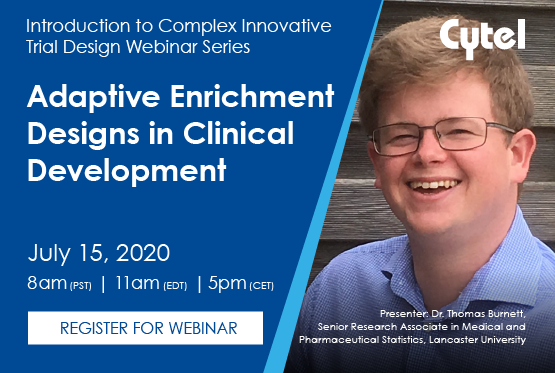Interview with Dr. Thomas Burnett on Adaptive Enrichment

Cytel is hosting a complimentary webinar series that introduces biostatisticians and other members of the development team to some of the more commonly used complex innovative trial designs, the benefits of each, and the practical considerations for adoption. You can access the replay of the completed webinars and register for the upcoming ones by clicking on the button.
In this blog, we interview Dr. Thomas Burnett who is a Senior Research Associate in Medical and Pharmaceutical Statistics at Lancaster University. His main research interests are Adaptive clinical trials and personalized medicine. In the upcoming Cytel webinar on July 15, Thomas will be presenting on the foundational elements of enrichment strategies and adaptive designs.
Cytel: Can you give us some background about your career and how you became involved in biostatistics?
Thomas Burnett (TB): My involvement with biostatistics started during my PhD. I did a PhD working on Adaptive Enrichment trials and personalized medicine, at the University of Bath. It was a case studentship, jointly funded by Roche and EPSRC (Engineering and Physical Sciences Research Council), and involved working closely with Roche researching the Bayesian optimization of Adaptive Enrichment trials. I spent some more time at the University of Bath before moving into my current role of Senior Research Associate in Medical and Pharmaceutical Statistics at Lancaster University.
Cytel: What is the method that you are advancing? Tell us a bit about its history: what is its ethical and commercial value?
TB: I will be talking about adaptive enrichment at the Cytel webinar this week. The idea is that you might have subgroups within your target population. These subgroups may behave or interact differently with different treatments, depending upon the scientific reasoning and on the disease area you are working in. I will explain this in more details in the webinar. The crux of it is that you will have to decide over which subgroup you may study. Suppose you have a finite resource, you may wish to study the group where the experimental treatment offers a bigger benefit. The objective is that instead of making this choice before the trial, you make a decision informed by trial observations or trial data.
Ethically, you wish to find patients who are benefiting from the treatment, and those are the patients that you wish to continue studying. And likewise, from a commercial standpoint, you want to conduct your trial in a population where you can demonstrate an effect.
Cytel: How did you get excited about adaptive designs?
TB: Even before I pursued my PhD, I had a strong inclination towards methodology. Hence, the obvious interest in adaptive designs which are currently a very active and broad area of research. It enabled me to get involved with methodological research part of things. Also adaptive designs, when applied under the right circumstances, can bring great benefits. These methods offer more flexibility and allow better decision making. I think right now, within the current global setting, flexibility of adaptive design is being applied to allow efficient decision making in difficult circumstances.
Cytel: Can you think of a memorable success story with this method?
TB: The success story I am going to talk about at the webinar is the TAPPAS trial, a study Cytel was involved in. The Phase 3 TAPPAS pivotal trial uses a unique adaptive design that angiosarcoma is an ultra-orphan indication. To address a rare tumor, you don’t have the opportunity to do multiple trials in multiple settings that characterize the more typical drug development paradigm in oncology. With the Phase 3 TAPPAS trial, the aim was to design a single study that would allow for the opportunity for global approval in an orphan indication. I will delve deeper into this during the webinar.
Cytel: Have there been others who needed persuading and how did you persuade them?
TB: One of the biggest concerns people have with regards to adaptive design is the statistical validity and integrity of the design. In my presentation I will talk about error rate and control of the error rate, which is a key part of any trial design.
We will spend some time talking about how you achieve that sort of error control in all possible cases introduced by the adaptive nature of the trial. The fact that you can do all this without compromising on the error rate or the integrity of the trial is crucial as it opens up many possibilities for how we go about decision making. We will talk about a few different methods in the webinar, for example I will talk about how the promising zone adaptive approach works in the East Enrichment module.
Cytel: How should Population Enrichment trial designs be used given the industry’s current challenges?
TB: Since the time I started working with adaptive enrichment, I have realized how personalized medicine is an important topic that has generated a lot of interest around it in the industry. This method addresses the formal analysis of the very hierarchical, defined subgroups. Population Enrichment provides designed flexibility that allows compromise while uncertain about which patient groups benefit, making it perfectly suited to this form of analysis.
Cytel: Where can a beginner learn more?
TB: You can find several papers on developing similar methodology. The East user manual has an example demonstrating the design of the TAPPAS trial that we will cover in more details in the webinar. As outreach officer for Adaptive Designs Working Group (ADWG) of the MRC network of Hubs for Trials Methodology Research, I am always happy to have people get in touch with me to discuss designs or events (you can do so here). And hopefully, one can learn a lot by attending the webinar on July 15 or by watching the replay later.
Webinar details:
Introduction to Population Enrichment Trial Designs
Wednesday, July 15, 11AM EDT
Recent developments in genomics have made it possible to test how those with different biomarkers will respond to a new therapy or vaccine, optimizing using “enrichment strategies” and adaptive designs. This webinar will teach you the foundational elements of these designs, setting the stage for later webinars on basket, umbrella and MAMS designs.
About Thomas Burnett
 Thomas is a Senior Research Associate in Medical and Pharmaceutical Statistics at Lancaster University, where his main research interests are Adaptive clinical trials and personalised medicine. He studied for his BSc in Mathematics and Statistics with placement at the University of Bath, spending a year working on sample design at the Office for National Statistics. Thomas also holds a PhD from the University of Bath, this was a case studentship that involved working closely with Roche Products Ltd researching the Bayesian optimisation of Adaptive Enrichment trials.
Thomas is a Senior Research Associate in Medical and Pharmaceutical Statistics at Lancaster University, where his main research interests are Adaptive clinical trials and personalised medicine. He studied for his BSc in Mathematics and Statistics with placement at the University of Bath, spending a year working on sample design at the Office for National Statistics. Thomas also holds a PhD from the University of Bath, this was a case studentship that involved working closely with Roche Products Ltd researching the Bayesian optimisation of Adaptive Enrichment trials.


